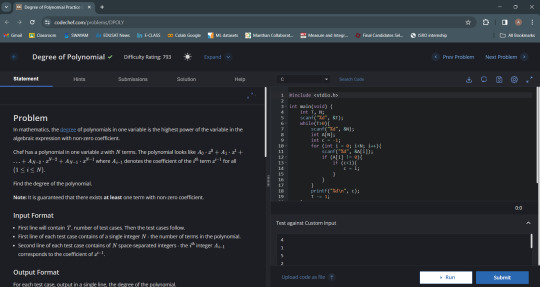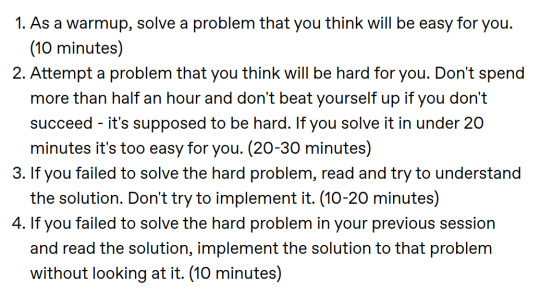#codechef
Explore tagged Tumblr posts
Text
The Thrill of Competitive Programming: A Deep Dive into Codeforces, AtCoder, and More
In the realm of software development, competitive programming stands out as a thrilling and intellectually stimulating activity. It challenges programmers to solve complex problems under tight time constraints, fostering skills that are invaluable in both academic and professional settings. This blog delves into the world of competitive programming, exploring its significance, benefits, and the…
#AI#amazon#apple#atcoder#chatgpt#codechef#codeforces#coding#competitive-programming#computer science#computer-science#cp#cpp#cs#css#DSA#google#hackerrank#java#javascript#leetcode#new#programming#python#tech
0 notes
Text
0 notes
Text


30 days of coding
(to ensure that I make full use of the programming course being taught rn)
Day 1// 06.01.2024//
Today was a very productive day. As a part of my data structures and algorithms course, we have to practice problems regularly on CodeChef. I had planned to do CP during winter break but the techfest hogged up my entire schedule. Now this will give me a chance to practice programming:)
P.S. this chapter made me cry so much. I had to call my sister immediately afterwards.
17 notes
·
View notes
Note
hey congrats on reaching CM (? wanted to find the post where you mention that to confirm but tumblr search misbehaves). was curious as to how many problems you've solved on cf? I primarily picked it up cause ik it helped friends with interview stuff but I'm 2 months in stuck at ~1200 so wondering if I should be doing things differently. on one hand most problems <1400 are greedy or math so I worry an actual interview will be more "algorithmic" and I'll be unprepared (maybe leetcode is better in this regard?). on the other hand it's soo much easier to fantasise about being good at cp than actually practicing. so. anyway wondering if you had any advice on this? CM in one year does not sound like the journey of your average cf-er. congrats again. cheers!
Thank you!
(full disclosure: I've kind of fallen off with competitive programming - I haven't competed on codechef since January and codeforces/leetcode since April)
My solving totals, ratings, and number of contests are:
Leetcode: 824 problems, 2571 rating, 41 contests
Codeforces: 69 problems, 2000 rating, 14 contests
Codechef: 32 problems, 2046 rating, 4 contests
If you're looking for interview prep I would skip codeforces. Leetcode problems are closer to what you'll get in interviews, and their contests are much less of a time commitment. I also code in Rust on CF/CC and Python on Leetcode, and I much prefer to take interviews in Python.
If you snoop around a bit on reddit and the leetcode forums, you can often find lists of problems people have seen at a specific company's interviews to get a flavor of what you're up against. I really recommend this - the problem I struggled with the most in getting my current job was on one such list for my company and I wish I'd gone through the list. This was before I got really good, though.
I think my rapid growth was fueled by three things:
I did math competitions all the way through college that have a similar skillset
My college classes taught a lot of competitive programming concepts (I learned what a SegTree was in class!)
I had a period of 5 months between graduating and starting my job where I was unemployed and highly motivated, and I did a ton of grinding during that period. Most of my leetcode solves are from that time
If you're looking to improve but don't have a ton of time to burn, here's the regimen I recommended to another asker:

#competitive coding#always happy to talk more about this stuff if you have other questions#or about specific problems/concepts
24 notes
·
View notes
Text
august 17
ok so today i will learn about trees (basic) and try solving easy questions and ask for project (its data visualization). it's a 6 hour plan.
watch youtube videos about trees
solve tree easy questions with youtube help
solve dsa codechef binary search questions
project

5 notes
·
View notes
Text
How to Make the Most of Online Java Training Resources

In today’s digital age, learning Java has become more accessible than ever, thanks to a variety of virtual learning platforms. Whether you're a student, working professional, or career changer, you can harness the power of online education to gain strong programming skills. The key lies in how effectively you use the available resources. With so many platforms offering online java training, it’s essential to develop a smart learning strategy that combines structure, practice, and support.
Identify the Right Platform
Not all training platforms are created equal. Some are known for their structured syllabus, while others focus on peer interaction or mentor support. It’s crucial to choose a platform that fits your learning style. Look for reviews, trial classes, and course outlines. A good platform should cover both basic and advanced Java topics such as object-oriented programming, collections, multithreading, JDBC, and frameworks like Spring and Hibernate.
Build a Custom Learning Schedule
Online learning offers flexibility, but that freedom also demands discipline. Begin by setting achievable goals and timelines. Divide your syllabus into manageable parts and allocate specific hours each day or week for studying. Use tools like planners or calendar apps to maintain consistency. Staying organized will keep you from getting overwhelmed and will help you make steady progress.
Combine Theory with Practical Coding
Merely watching tutorials or reading documents isn't enough to master Java. As you learn new concepts, immediately apply them by writing and testing code. Utilize integrated development environments (IDEs) like IntelliJ IDEA or Eclipse to practice. Many online platforms provide coding sandboxes or project builders—take full advantage of these to deepen your understanding.
Participate in Challenges and Projects
One of the most effective ways to solidify your learning is by taking part in real-world projects and coding challenges. Websites like HackerRank, LeetCode, and CodeChef host Java coding problems ranging from beginner to advanced levels. These platforms help improve your logical thinking and problem-solving skills, which are crucial for job readiness.
Join Peer and Mentor Communities
The online learning journey can sometimes feel isolating, but it doesn’t have to be. Engage with fellow learners through forums, Discord groups, or platform-specific communities. Ask questions, participate in discussions, and share your code. Some platforms also offer mentorship programs, connecting you with experienced professionals who can guide your progress.
Focus on Core Concepts Before Advanced Topics
It’s tempting to jump straight into popular frameworks like Spring Boot or Hibernate, but without a solid understanding of core Java, it’s easy to get lost. Spend ample time on fundamentals such as variables, loops, conditionals, arrays, and OOP principles. Once these are second nature, transitioning into advanced topics becomes smoother and more productive.
Keep Learning Interactive and Fun
Monotony can kill motivation. Keep things interesting by mixing up your learning resources. Alternate between video lectures, articles, coding exercises, and podcasts. You can even join virtual study groups or attend live webinars to break the routine and get fresh perspectives.
Take Notes and Document Your Learning
Maintaining a digital or handwritten notebook can significantly boost your retention. Jot down code snippets, commands, and key takeaways from each lesson. These notes will serve as a quick reference guide when you start working on projects or preparing for interviews.
Evaluate Progress Through Mock Tests
Most online platforms offer quizzes and mock tests—don’t skip them. These tests not only reinforce what you’ve learned but also help you identify weak areas. Regular assessments are a great way to measure your improvement and build confidence.
Explore Integration with Other Skills
Once you’re comfortable with Java, explore how it connects with other domains like databases, front-end development, or mobile app development. Expanding your skill set adds value to your profile and opens up broader career opportunities.
Platforms like Traininglobe provide well-structured Java learning paths that include hands-on assignments and industry-relevant projects, which enhance your portfolio and improve your job prospects.
Application in Related Fields
As you grow more confident with Java, it's helpful to understand how coding skills apply in broader tech fields. For instance, designing responsive web applications often involves a cross-functional approach. Understanding technologies tied to courses website design gives you a full-stack perspective and increases your versatility as a developer.
Conclusion
Online Java training resources offer more than just convenience—they offer a personalized and rich learning experience. The trick to getting the most from these resources lies in setting clear goals, staying consistent, engaging with communities, and applying what you learn. By combining self-discipline with interactive tools and expert guidance, you can build a solid foundation in Java programming and confidently move toward your career goals. Keep exploring, stay curious, and let your journey with Java be as dynamic as the language itself.
0 notes
Text
B.Tech in Computer Science: Your Gateway to a Future-Proof Career in Tech
In today's digitally powered world, the demand for skilled computer science professionals is at an all-time high. B.Tech in Computer Science is one of the most sought-after undergraduate degrees that opens doors to limitless career opportunities in tech-driven industries. If you're passionate about coding, software development, data science, artificial intelligence, or cybersecurity, this is the ideal path to build a rewarding and future-proof career.

What is B.Tech in Computer Science?
Bachelor of Technology in Computer Science (B.Tech CSE) is a 4-year undergraduate program that focuses on the fundamentals of computer science and programming. The curriculum blends theoretical knowledge with hands-on practice in programming languages, algorithms, software development, data structures, and emerging technologies like AI, machine learning, blockchain, and IoT.
Students learn to design and develop computer systems, analyze data, build secure networks, and solve complex computational problems — making them industry-ready from the very start.
Why Choose B.Tech in Computer Science?
Here are compelling reasons to choose a B.Tech in Computer Science Engineering:
1. High Demand Across Industries
From healthcare to finance, manufacturing to e-commerce, every industry today relies on computer systems and software. This means a massive demand for software engineers, data scientists, AI developers, and network architects.
2. Excellent Salary Packages
Computer science engineers enjoy some of the highest entry-level salary packages in India and globally. Top recruiters include Google, Microsoft, Amazon, Infosys, TCS, and Wipro.
3. Future-Ready Curriculum
Top institutions ensure the curriculum is frequently updated with emerging tech trends, enabling students to stay ahead in a fast-changing digital world.
4. Global Career Opportunities
Many pursue MS in Computer Science, MBA, or certification programs for further specialization.
5. Flexible Career Paths
After graduation, you can choose careers in:
Software Development
Web & App Development
Artificial Intelligence & Machine Learning
Data Science & Big Data Analytics
Cybersecurity
Cloud Computing
UI/UX Design
DevOps
Blockchain Development
Key Subjects in B.Tech CSE
Programming in C/C++, Java, Python
Data Structures and Algorithms
Operating Systems
Computer Networks
Database Management Systems (DBMS)
Software Engineering
Artificial Intelligence
Machine Learning
Cybersecurity
Internet of Things (IoT)
Eligibility Criteria
To pursue a B.Tech in Computer Science, candidates must:
Have completed 10+2 with Physics, Chemistry, and Mathematics (PCM).
Career Opportunities After B.Tech in Computer Science
Here's a list of top career roles you can pursue:
Job Role
Average Salary (INR per annum)
Software Engineer
₹4 – ₹12 LPA
Data Scientist
₹6 – ₹18 LPA
AI/ML Engineer
₹8 – ₹20 LPA
Web Developer
₹3 – ₹8 LPA
Cybersecurity Analyst
₹5 – ₹15 LPA
Cloud Architect
₹10 – ₹25 LPA
DevOps Engineer
₹7 – ₹20 LPA
Many graduates also launch their startups, build freelance careers, or contribute to open-source projects, enhancing their visibility and reputation in the tech community.
Best Colleges for B.Tech Computer Science in India
Choosing the right college is crucial. Here are some top institutions:
IITs and NITs
BITS Pilani
IIIT Hyderabad
VIT Vellore
Alpine Group of Institutes, Dehradun – Known for modern labs, experienced faculty, and strong placement assistance in tech companies.
Trending Technologies Covered in B.Tech CSE
Artificial Intelligence
Machine Learning
Blockchain Technology
Cybersecurity
Cloud Computing
Data Science
Full Stack Development
Quantum Computing (Introductory Modules)
These subjects ensure students remain future-ready in a highly competitive digital market.
Tips to Succeed in B.Tech CSE
Stay consistent with coding practice on platforms like LeetCode, HackerRank, and CodeChef.
Build mini projects and contribute to GitHub.
Attend tech meetups, hackathons, and coding bootcamps.
Complete certifications on platforms like Coursera, edX, or Google Cloud.
Keep updating yourself with trends like GenAI, AR/VR, and Edge Computing.
FAQs About B.Tech in Computer Science
Q1: Is B.Tech in Computer Science difficult?
A: It depends on your interest and dedication. With consistent practice in coding and understanding the fundamentals, the course becomes manageable and enjoyable.
Q2: Can I pursue B.Tech CSE without prior coding knowledge?
A: Yes. Most colleges start from the basics. Passion and willingness to learn are more important than prior experience.
Q3: What are the best programming languages to learn during B.Tech CSE?
A: Start with C/C++, then move to Python, Java, and JavaScript based on your career goals.
Q4: Is B.Tech in Computer Science good for government jobs?
A: Yes. Many government exams like GATE, ISRO, and DRDO prefer candidates with a computer science background.
Q5: What is the scope of B.Tech in Computer Science in India?
A: The scope is immense with opportunities in IT companies, startups, public sector, higher studies, and research.
Final Thoughts
B.Tech in Computer Science is not just a degree; it's a ticket to enter one of the world's most dynamic, innovative, and highly paid sectors. With the growing reliance on technology, the scope of CSE is expanding like never before. Choose a reputable institution, focus on learning the latest skills, and you'll be on your way to a successful career in tech.
#b.tech in computer science#computer science#computer#B.tech in computeer science#computer science course in India
1 note
·
View note
Text
Clavier français pour Jeux Vidéo : Existe-t-il une Version Spéciale ?
codechef html and css compiler
telecharger clavier français
0 notes
Text


25.01.2024// Day 12 of 30 days of code
Woke up early to revise for today's quiz
Quiz went well<3
Did few programs on CodeChef
Python theory
Had a good me time too: washed my hair, skin care, sat in the sun for sometime, ate fruits :))
12 notes
·
View notes
Text
Internships for CSE Students in Bangalore: Your Gateway to a Bright Tech Career
Bangalore, India’s tech capital, is a dream destination for Computer Science Engineering (CSE) students seeking top-notch internship opportunities. With a thriving IT ecosystem, the city hosts global tech giants, innovative startups, and renowned research centers, making it the perfect place to gain real-world experience and boost your career.
Why Choose Bangalore for a CSE Internship?
Bangalore is home to some of the world’s biggest IT firms, including Google, Microsoft, Infosys, TCS, Wipro, and IBM, along with a booming startup scene in AI, fintech, cybersecurity, and cloud computing. The city provides a unique platform for students to gain hands-on experience, work on live projects, and interact with industry experts. Interning in Bangalore not only enhances technical skills but also provides valuable networking and job placement opportunities.
Top Domains for CSE Internships in Bangalore
As a CSE student, choosing the right domain can shape your career. Some of the most in-demand fields include:
Software Development & Full Stack Development – Learn web and mobile app development using Java, Python, React, Node.js, and Angular.
Artificial Intelligence & Machine Learning – Work on deep learning, NLP, and data-driven models using TensorFlow, PyTorch, and OpenCV.
Cybersecurity & Ethical Hacking – Gain expertise in network security, penetration testing, and cryptography.
Data Science & Big Data Analytics – Learn data processing and visualization using Python, R, Hadoop, and SQL.
Cloud Computing & DevOps – Work with AWS, Azure, Kubernetes, and Docker for cloud-based solutions.
Blockchain Development – Explore smart contracts, decentralized applications, and cryptocurrency technologies.
IoT & Embedded Systems – Integrate AI with smart devices using Raspberry Pi, Arduino, and edge computing.
Top Companies Offering CSE Internships in Bangalore
Bangalore offers a plethora of internship opportunities at leading MNCs and startups. Some top companies hiring CSE interns include:
Google – Software engineering, AI, and cloud computing internships.
Microsoft – Data science, software development, and cybersecurity.
Amazon – Cloud computing, AI, and big data internships.
Infosys & Wipro – IT services, software development, and machine learning projects.
Flipkart & Swiggy – E-commerce and AI-driven analytics.
Startups like Zerodha, Razorpay, and Freshworks – Cutting-edge technology and innovative solutions.
How to Secure a CSE Internship in Bangalore?
With high competition, securing an internship requires a proactive approach. Here’s how you can improve your chances:
Build a Strong Portfolio – Showcase your coding projects on GitHub, Kaggle, and personal websites.
Master Data Structures & Algorithms – Participate in coding contests on Leetcode, CodeChef, and HackerRank.
Network with Professionals – Attend hackathons, tech meetups, and LinkedIn networking events.
Apply on Job Portals – Use Internshala, LinkedIn, AngelList, and Naukri for internship listings.
Leverage College Placement Cells – Many companies offer internships through campus recruitment.
Benefits of Doing an Internship in Bangalore
Interning in Bangalore offers more than just technical skills. You gain exposure to corporate culture, teamwork, problem-solving, and innovation. Many interns receive pre-placement offers (PPOs), securing full-time jobs even before graduation.
Final Thoughts
A CSE internship in Bangalore can be the stepping stone to a successful tech career. With abundant opportunities in AI, cloud computing, cybersecurity, and software development, students can explore their interests, gain hands-on experience, and build strong industry connections.
0 notes
Text
https://www.provenexpert.com/realismhoodie/
https://mimedia.in/1739132459553520_31989
https://culturesbook.com/1742242163969437_27026
0 notes
Text
Importance of Data Structures in Computer Science

Introduction
The importance of data structures in computer science lies in their role in the efficient storage and management of data. Understanding data structures is crucial for both new and expert programmers to write optimized and scalable code. TCCI-Tririd Computer Coaching Institute emphasizes the essential nature of learning data structures to build a strong foundation in programming and problem-solving skills.
What Are Data Structures?
A data structure is a way of organizing and storing data in such a way that operations on the data can be performed in an efficient manner. These data structures define ways through which data is accessed, modified, and manipulated in a computer system.
Types of Data Structures
1. Linear Data Structures
Are:
Arrays
Linked Lists
Stacks
Queues
2. Non-Linear Data Structures
Trees (Binary Trees, Binary Search Trees, AVL Trees, etc.)
Graphs (Directed, Undirected, Weighted, etc.)
Hash Tables
Why Are Data Structures Important in Computer Science?
1. Efficient Data Management
Good data structures help organize and quickly retrieve data, which improves performance and decreases execution time.
2. Optimized Algorithm Performance
Data structures play a key role in any algorithm. The choice of a data structure directly affects the speed and efficiency of an algorithm.
3. Scalability
Scalable applications that can accommodate loads of data without degrading in performance would require optimized structures.
4. Memory Optimization
An appropriate data structure ensures that memory is utilized optimally so that there is no wastage.
Real-Time Applications of Data Structures
1. Database Management Systems
Databases use B-Trees and Hash Tables for indexing data and efficient searching of data.
2. Operating Systems
Operating systems use queues for process scheduling and stacks for memory management.
3. Artificial Intelligence and Machine Learning
Most tree and network structures are based on graphs, heavily relied upon by AI and machine learning algorithms.
4. Web Development
Hash tables and graphs are often used for efficient searching, sorting, and recommendation systems on websites.
Data Structures Course at TCCI-Tririd Computer Coaching Institute
At TCCI-Tririd Computer Coaching Institute, we provide high-grade data structures training for both students and professionals. The courses offered include:
Basic concepts of data structures
Extensive hands-on coding sessions
Examples of real-life applications
Interview and competitive programming preparations
Conclusion
Data structures are a backbone of computer science and therefore are mandatory for anyone who is interested in pursuing software development. Getting to learn data structures from TCCI-Tririd Computer Coaching Institute would prepare you with the skills needed to solve difficult problems efficiently and develop durable applications.
Location: Bopal & Iskon-Ambli Ahmedabad, Gujarat
Call now on +91 9825618292
Get information from: tccicomputercoaching.wordpress.com
FAQ
1: Why learn data structures?
Learning data structures improves your coding efficiency and propelling abilities making you a better programmer.
2: What is the best way to learn data structures for the practice?
If you are looking for websites to practice coding problems on, check out LeetCode, CodeChef, and HackerRank that'll help you master your data structures.
3: Data Structures- Are they really important to job interviews?
Indeed, data structures and algorithms are generally discussed in most technical job interviews.
4: Do I need programming skills to learn Data Structures?
It is best to have at least a minimal programming knowledge before you jump into data structures but TCCI-Tririd Computer Coaching Institute offers various entry point courses for getting into these things.
5: How long does it take to learn data structures?
One can build a good grasp on data structures within 2-3 months if consistently practiced.
#Best computer courses near me#Data Structures in Computer Science#Diploma Tuition Classes in Ahmedabad#TCCI - Tririd Computer Coaching Institute#Top Computer Institute Iskcon-Ambli Road Ahmedabad
0 notes
Text
0 notes
Text
Is Computer Science Engineering Very Difficult?
If you are thinking about pursuing Computer Science Engineering (CSE), you might have heard people say that it’s a tough course. But how true is that? Let’s break it down in a simple way.
What Makes CSE Challenging?
Like any engineering branch, CSE comes with its own set of challenges. Here are a few reasons why some students find it difficult:
Logical Thinking – Unlike subjects that rely on memorization, CSE demands logical thinking and problem-solving skills.
Programming Languages – You will need to learn different coding languages like Python, Java, C++, etc.
Mathematics – Concepts like algorithms, data structures, and discrete mathematics form the core of CSE.
Continuous Learning – Technology changes fast, so you need to keep updating your knowledge.
Project Work – Hands-on experience through projects and practical assignments is a major part of the curriculum.
Is It Really That Hard?
The difficulty level of CSE depends on how you approach it. If you are willing to practice coding regularly and understand concepts rather than just memorize them, you will do well. Many students start with zero programming knowledge and still succeed by putting in consistent effort.
How to Make CSE Easier?
Start with Basics – Before jumping into complex coding, get comfortable with the fundamentals of programming.
Practice Coding Daily – Websites like LeetCode, HackerRank, and CodeChef help in improving coding skills.
Work on Projects – Apply what you learn through small projects.
Join Study Groups – Learning with peers helps in understanding concepts better.
Choose the Right College – A good college provides proper guidance, practical exposure, and industry connections.
Where to Study CSE in Bhubaneswar?
If you are looking for a college of engineering and technology in Bhubaneswar, there are many reputed institutions that offer quality education. Colleges like NMIET focus on a balanced approach, combining theoretical knowledge with practical experience. With strong faculty support and industry collaborations, students get a solid foundation in CSE.
Career Opportunities in CSE
One of the biggest advantages of studying CSE is the wide range of career options available. Graduates can work in software development, data science, cybersecurity, artificial intelligence, and many other fields. Companies like Google, Microsoft, TCS, and Infosys actively hire CSE graduates.
Final Thoughts
So, is Computer Science Engineering difficult? It can be, but it’s not impossible. With the right mindset, dedication, and a structured learning approach, you can excel in this field. If you are passionate about technology and problem-solving, CSE can be a rewarding career choice.
If you are exploring options, consider checking out the college of engineering and technology in Bhubaneswar to find the best fit for your education and career goals.
#top 10 engineering colleges in bhubaneswar#private engineering colleges in bhubaneswar#top 5 engineering colleges in bhubaneswar#college of engineering and technology bhubaneswar#college of engineering bhubaneswar#best engineering colleges in bhubaneswar
0 notes
Text
How Chitkara University Shapes the Future of B Tech Computer Science Graduates

In the ever-evolving world of technology, the demand for skilled computer science professionals continues to soar. Pursuing a B Tech Computer Science degree from a prestigious institution like Chitkara University provides students with a comprehensive education, cutting-edge resources, and the industry exposure required to thrive in the competitive tech landscape. Known for its innovation-driven curriculum and commitment to excellence, Chitkara University is a powerhouse for aspiring computer scientists.
This blog delves into how Chitkara University shapes the future of B Tech Computer Science graduates, preparing them for dynamic careers in technology, research, and entrepreneurship.
1. Industry-Focused Curriculum
Chitkara University’s B Tech Computer Science program is designed to keep pace with the rapidly changing tech industry. The curriculum is regularly updated to include emerging technologies, ensuring that students gain proficiency in the latest tools and frameworks.
Key Curriculum Highlights:
Core Subjects: Data Structures, Algorithms, Database Management Systems, Computer Networks, Operating Systems, and Software Engineering.
Emerging Technologies: Artificial Intelligence (AI), Machine Learning (ML), Data Science, Blockchain, Internet of Things (IoT), and Cloud Computing.
Hands-on Learning: Practical labs, coding bootcamps, hackathons, and real-world project work.
This well-rounded curriculum helps students develop technical acumen while fostering critical thinking, problem-solving, and creativity.
2. Experienced Faculty and Mentorship
The success of Chitkara University’s B Tech Computer Science graduates is largely attributed to its team of highly qualified faculty members. These educators not only have strong academic backgrounds but also bring real-world industry experience into the classroom.
Faculty Benefits:
One-on-One Mentorship: Students receive guidance on academics, research projects, and career planning.
Industry Experts as Guest Lecturers: Regular sessions with industry leaders provide insights into current trends and future opportunities.
Research Opportunities: Students collaborate with faculty on research projects, encouraging innovation and discovery.
3. Emphasis on Practical Learning and Innovation
Chitkara University adopts a practical approach to learning. The B Tech Computer Science program emphasizes hands-on experience to bridge the gap between theory and real-world application.
Opportunities for Practical Learning:
Capstone Projects: Students work on real-life problems, often in collaboration with industry partners.
Hackathons and Coding Competitions: Platforms like CodeChef and HackerRank help students test their skills against national and international peers.
Innovation Labs: Access to advanced labs specializing in AI, robotics, data analytics, and more.
These experiences cultivate critical problem-solving skills and promote innovation.
4. Industry Collaborations and Internship Opportunities
Chitkara University has established strong ties with leading tech companies, ensuring that students gain valuable industry exposure through internships and collaborative projects.
Key Collaborations Include:
Microsoft, IBM, and Google: Students participate in specialized workshops and certification programs.
Start-Up Ecosystem: Through the Chitkara Innovation Incubator, students can work with startups or even launch their own ventures.
Mandatory Internships: Students complete internships as part of their coursework, gaining hands-on experience in real-world settings.
These partnerships not only offer learning opportunities but also increase employability post-graduation.
5. Focus on Emerging Technologies
The tech landscape is constantly evolving, and Chitkara University ensures its B Tech Computer Science graduates are prepared for future challenges. The curriculum places special emphasis on high-demand areas like:
Artificial Intelligence and Machine Learning
Cybersecurity and Ethical Hacking
Blockchain and Cryptocurrency
Big Data Analytics and Cloud Computing
By staying at the forefront of emerging technologies, students gain a competitive edge in the job market.
6. Soft Skills and Leadership Development
Technical skills alone are not enough to succeed in today’s workplace. Chitkara University integrates soft skills development into its B Tech Computer Science program to cultivate well-rounded professionals.
Key Focus Areas:
Communication Skills: Public speaking, technical writing, and effective teamwork.
Leadership Training: Workshops on project management, conflict resolution, and decision-making.
Entrepreneurial Mindset: Students are encouraged to think creatively and take calculated risks.
These skills enable graduates to excel not only as developers but also as team leaders and entrepreneurs.
7. Strong Placement Support
One of the most significant advantages of pursuing a B Tech Computer Science at Chitkara University is the robust placement support offered to students. The university maintains strong relationships with top recruiters, ensuring high placement rates year after year.
Top Recruiting Companies:
Infosys
Wipro
TCS
Cognizant
Amazon
Microsoft
Deloitte
The placement cell provides resume-building workshops, mock interviews, and career counseling, ensuring students are job-ready upon graduation.
8. Global Exposure and Exchange Programs
Chitkara University offers global exposure through academic exchange programs with prestigious international universities. These programs allow students to experience diverse cultures and gain a broader perspective on global technology trends.
International Opportunities Include:
Semester exchange programs
Summer schools abroad
Joint research initiatives
Global exposure enhances students’ adaptability and opens doors to international career opportunities.
9. Alumni Network and Career Growth
Chitkara University boasts a strong alumni network that plays an active role in mentoring current students and providing career guidance. Many alumni hold leadership positions in global tech companies, creating opportunities for networking and mentorship.
The university regularly hosts alumni meet-ups, workshops, and webinars, enabling students to gain insights into various industries and career paths.
Conclusion
Chitkara University’s B Tech Computer Science program is more than just a degree—it’s a transformative journey that shapes the future of aspiring tech professionals. From a cutting-edge curriculum and hands-on learning to strong industry connections and global exposure, the program equips students with the knowledge, skills, and confidence to excel in the fast-paced tech world.
If you’re passionate about technology and aspire to make a meaningful impact, Chitkara University’s B Tech Computer Science program is your gateway to a successful career. Explore limitless possibilities and become a part of a vibrant tech community that’s shaping the future. FAQs 1. What makes Chitkara University’s B Tech Computer Science program stand out?
Chitkara University’s B Tech Computer Science program offers an industry-driven curriculum, hands-on learning, access to cutting-edge technologies, and strong industry partnerships. With experienced faculty, practical exposure through internships, and a focus on emerging fields like AI, Data Science, and Cybersecurity, students graduate as well-rounded professionals ready for global tech careers.
2. What career opportunities are available after completing B Tech Computer Science?
Graduates of the B Tech Computer Science program can pursue roles such as Software Developer, Data Scientist, AI Engineer, Cybersecurity Analyst, Cloud Solutions Architect, Systems Analyst, and Web Developer. Opportunities also exist in specialized fields like Blockchain, IoT, and Robotics, across industries including IT, finance, healthcare, and e-commerce.
3. Does Chitkara University offer internship and placement support for B Tech Computer Science students?
Yes, Chitkara University has a dedicated placement cell that facilitates internships and final placements with top recruiters like Amazon, Microsoft, Infosys, and Wipro. Students also participate in real-world projects, coding competitions, and workshops that enhance employability and provide industry-relevant experience.
4. Are there opportunities to specialize within the B Tech Computer Science program?
Absolutely! Chitkara University offers specializations in high-demand areas such as Artificial Intelligence, Machine Learning, Data Science, Cloud Computing, Blockchain, and Cybersecurity. These tracks enable students to tailor their education based on their career goals and emerging industry needs.
5. Can B Tech Computer Science students participate in global exchange programs?
Yes, Chitkara University provides international exposure through academic exchange programs, summer schools, and collaborative research with top global universities. These opportunities allow students to experience diverse cultures, broaden their academic perspectives, and explore global career possibilities.
0 notes